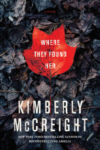Where They Found Her
The questions that follow are intended to enhance your group’s reading and discussion of Where They Found Her by Kimberly McCreight
- In what ways is Molly prepared, or not, to report on the tragic discovery in Ridgedale?
- How does Molly’s job as a journalist compare with her previous one as a lawyer? In what ways are the skills required the same? Different?
- In what situations might a newspaper editor be justified in not publishing certain facts of a story? What are a paper’s social responsibilities?
- Examine the many different experiences of motherhood in the novel. What are the various challenges of each?
- How does shifting between several narrative voices affect the novel? Why do you think an author might use this technique?
- Consider the use of newspaper articles, readers’ online comments, Molly’s counseling transcripts, even phone texts in the novel. What does each bring to the story? How are these sources of information different?
- After her initial shock, Molly comes to believe covering the story of a baby that has died will help her recover from the death of her own baby. Why does she feel this way? What’s a healthy and effective way to respond to grief?
- Erik cautions Molly that it’s human nature for even good, honest people to “support…a self-serving narrative,” even to the point of excluding facts. Why is this so?
- What are some examples of lying in the novel? Are they all equal? When is lying justified?
- Steve, Ridgedale’s Chief of Police, has a very complicated position in the case. What different forces and loyalties are at work within him as he investigates?
- How has the technological ability for readers to offer immediate online comments about articles changed the nature and effect of reading the news?
- Barbara says that her husband Steve and daughter Hannah have “compassion [as] their strength” but suggests “all this caring for strangers came at a cost.” What might she mean? What is a healthy amount of compassion?
- Molly wrestles with the idea that “not everything about where you’re headed…has to be about where you’ve been.” To what extent does a person’s past influence or define his or her future?
- Both Molly and Sandy have had very troubled mothers. What are the emotional or behavioral results of this poor parenting? What does it take to overcome such a start in life and become healthy and happy?
- Sandy shows incredible strength throughout the novel. What qualities does she possess? Did her strengths develop because of or despite her difficult childhood?
- In a discussion about Cole, Barbara yells at Rhea that she cannot understand the situation because she does not have children. To what extent is this true?

